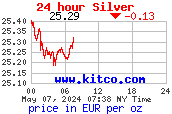1) Pour les marchés il est clair que derrière les coulisses, l'Europe se prépare au défaut de la Grèce, et que Irlande et Portugal suivront.
2) Cela va conduire à d'énormes pertes pour les banques
3) Il est temps de se préparer aux niveaux les plus bas depuis 2006.
"la fête est finie"
Traduit de Deutsche MittelstandsNachrichten
KWN Special - Martin Armstrong: Who Will Collapse First? (devinez?)
[...] When asked which currency will collapse first, Armstrong responded, “Americans tend to focus really just on the United States. The United States is, among the Western countries, it’s actually in the best shape. Europe is going to largely collapse first. What you have to understand with the dollar is that the dollar is the reserve currency. What that means is that about 40% of the interest that we pay goes overseas.
All of the foreign central banks hold US government bonds, not actually physical dollars, but they actually hold bonds as a reserve. So the reserve currency is not something that is going to crack first. You have to understand that because if the dollar were to be the first thing to collapse, the rest of the world has to go with it.

In Europe, to put it into an American context, imagine if every state had the right to print dollars, it would be total chaos. That’s what Europe did (by allowing individual country bonds to be issued) and that’s why I warned them that they were going to collapse, but politicians just didn’t want to hear it ten years ago. They were more interested in creating a euro than they were in creating a (long-term functional) system.
...This is also why the banking system over there is in trouble. They (European leaders) are going to try to hang on as long as they can.”
Les investisseurs ont perdu confiance: Ms Merkel delivers, but the threat to the euro remains
The Independant
[...] With a free hand, Ms Merkel could yet win through, building a consensus behind each individual step as required and gradually inching German public opinion around to support, or at least accept, all necessary measures. But there is no room to manoeuvre. Investors' catastrophic loss of confidence has already spread alarmingly and now threatens Spain and Italy, which between them hold €1.5 trillion worth of debt. Exposed banks are in increasing need of recapitalisation. And the next round of more radical rescue measures is, rightly, on the table, before the ink is even dry on Germany's ratification of the last ones. Yesterday was indeed a triumph for Ms Merkel. But she does not have the time to do the same again.
PS: La situation des banques italiennes est très critique. Le système ne devrait pas survivre au mois d'octobre.



![[Most Recent Quotes from www.kitco.com]](http://www.kitconet.com/charts/metals/gold/t24_au_en_usoz_2.gif)
![[Most Recent Quotes from www.kitco.com]](http://www.kitconet.com/charts/metals/gold/t24_au_en_euoz_2.gif)



Aucun commentaire:
Enregistrer un commentaire
Le blog est fermé. Allez sur la nouvelle rubrique des moutons écrasés (la suite)
Remarque : Seul un membre de ce blog est autorisé à enregistrer un commentaire.